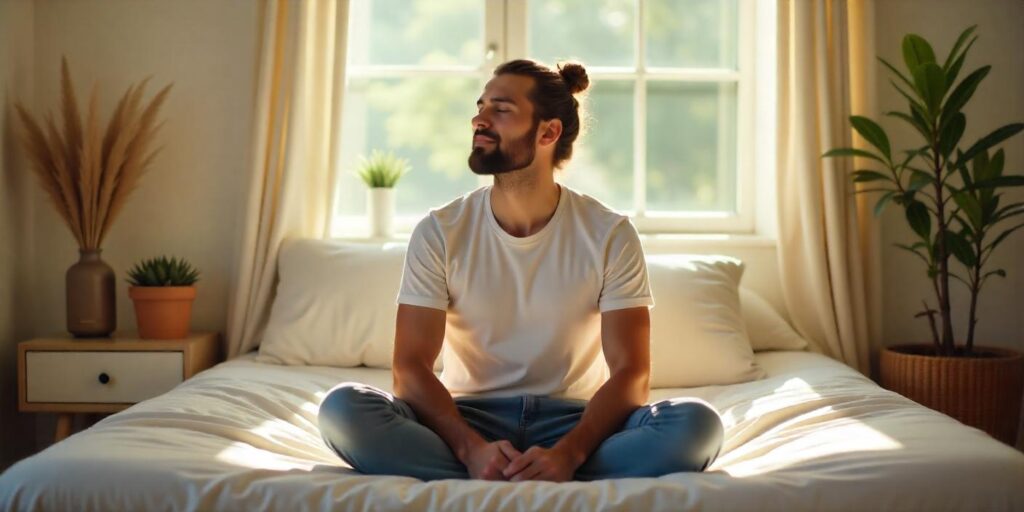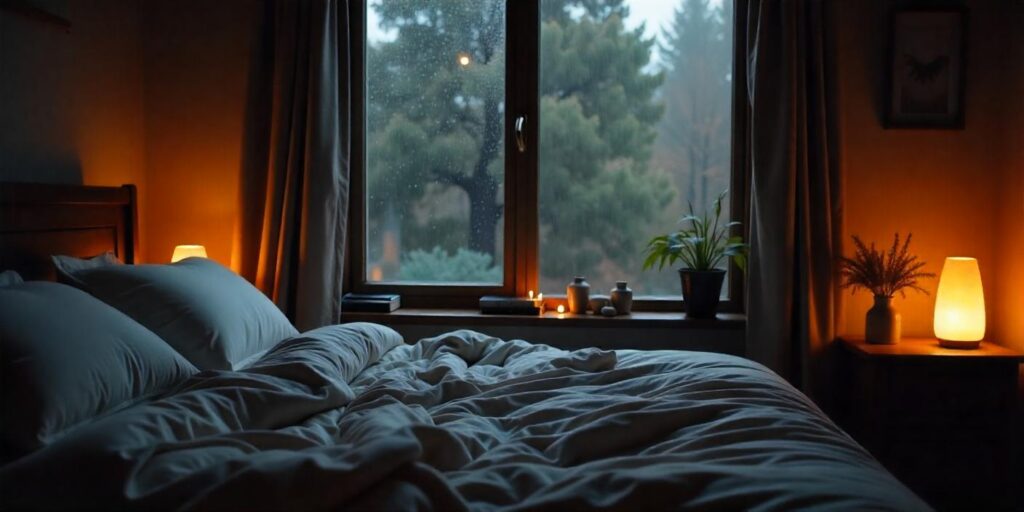Falling asleep fast isn’t always easy—especially in today’s world of constant stimulation and stress. Whether it’s overthinking, screen exposure, caffeine, or simply a racing mind, many people struggle to relax and fall asleep quickly. Fortunately, nature offers gentle, effective methods to calm the body and mind without needing medication. This post explores natural, science-backed strategies that can help you fall asleep faster and enjoy deeper, more restorative sleep.
🧘♀️ 1. Practice Relaxation Techniques Before Bed

Relaxation techniques help signal to your body that it’s time to wind down. Here are three that can work wonders:
- Progressive Muscle Relaxation (PMR): Tense and relax each muscle group from your toes up to your face. This releases physical tension and reduces stress.
- Deep Breathing: Try the 4-7-8 breathing method: inhale for 4 seconds, hold for 7, exhale for 8. This technique activates the parasympathetic nervous system, which promotes calmness.
- Guided Meditation: Use apps like Calm or Headspace to guide you through a meditation designed for sleep.
Regular use of these methods can train your mind to transition into sleep mode more easily.
🌿 2. Sip on Herbal Teas

Herbal teas have been used for centuries to soothe the nervous system. Some of the best options for sleep include:
- Chamomile: Contains apigenin, an antioxidant that binds to receptors in the brain, promoting sleepiness.
- Lavender: Known for its calming scent, lavender tea can reduce anxiety and improve sleep quality.
- Valerian Root: Acts as a natural sedative, though its strong flavor may take some getting used to.
Avoid caffeine after 2 p.m., and opt for these herbal alternatives in the evening to gently prepare your body for sleep.
📱 3. Limit Screen Time at Night

Blue light emitted by phones, tablets, and computers can interfere with melatonin production—the hormone that regulates your sleep-wake cycle.
To reduce this impact:
- Use a blue light filter on your devices after sunset.
- Avoid screens at least 30–60 minutes before bed.
- Consider reading a physical book or listening to calming music instead.
If you need to use your device, try apps like f.lux or enable Night Shift mode on Apple devices to reduce blue light exposure.
🕯️ 4. Create a Calm Bedroom Environment

Your sleeping environment greatly impacts how quickly you fall asleep. Here’s how to optimize it:
- Keep it cool: The ideal sleep temperature is between 60–67°F (15–19°C).
- Block out light and noise: Use blackout curtains, earplugs, or a white noise machine.
- Use calming scents: Essential oils like lavender, sandalwood, and cedarwood can promote a sense of calm.
Make your bedroom a dedicated sanctuary for rest—free from work, clutter, or stressors.
🏃♂️ 5. Move Your Body (But Not Too Late!)

Physical activity helps regulate your circadian rhythm and reduce anxiety. Exercise increases the body’s production of serotonin (which calms the brain) and decreases levels of cortisol (a stress hormone).
- Morning or afternoon workouts are best for sleep quality.
- Avoid high-intensity exercise close to bedtime, as it may overstimulate you.
- Consider yoga or gentle stretching in the evening—it can lower your heart rate and calm your mind.
Even a 20-minute walk during the day can lead to faster, deeper sleep at night.
🧂 6. Eat Sleep-Supportive Foods

Some foods naturally promote better sleep thanks to their nutrient content. Try incorporating these into your dinner or evening snack:
- Bananas: Rich in magnesium and potassium, they help relax muscles.
- Almonds and walnuts: Packed with magnesium and melatonin.
- Oats: A slow-release carbohydrate that encourages serotonin production.
- Warm milk: Contains tryptophan, which supports melatonin production.
Avoid heavy, spicy, or sugary foods late at night, as they can disrupt digestion and delay sleep onset.
✍️ 7. Keep a Bedtime Journal

Mental clutter—worries, unfinished tasks, racing thoughts—can prevent sleep. Writing them down can help:
- “Brain dump” before bed: List what’s on your mind to release it.
- Keep a gratitude journal: Write 3 things you’re thankful for to shift focus from stress to calm.
- Track your sleep habits: Noting what works and what doesn’t can help you refine your routine.
Journaling creates a mental “off-switch,” allowing your mind to rest.
☀️ 8. Stick to a Sleep Schedule

Our bodies love consistency. Going to bed and waking up at the same time every day—yes, even on weekends—helps reinforce your internal sleep-wake cycle.
- Try to wake up at the same time every day, even if you slept poorly.
- Expose yourself to natural light in the morning to reset your circadian rhythm.
- Wind down 30–60 minutes before bed with the same relaxing ritual.
This consistency trains your body to expect sleep at the right time, making it easier to fall asleep naturally.
🛑 Bonus Tip: Avoid Sleep Saboteurs
Certain behaviors can counteract your efforts. Watch out for:
- Caffeine and alcohol: Caffeine is a stimulant, while alcohol can fragment sleep.
- Napping too long: If you nap, limit it to 20–30 minutes and not too late in the day.
- Clock-watching: Turn your clock away from your bed—worrying about the time only increases stress.
🌙 Conclusion: Calm Mind, Better Sleep
Falling asleep fast doesn’t have to involve medications or frustration. By creating a consistent routine and using nature-inspired methods—like calming teas, mindfulness, and an ideal sleep environment—you can gently guide your body and mind into a restful state. Start small, experiment with what works best for you, and give your body time to adjust.
Your best sleep might be just a few deep breaths—or sips of chamomile—away.



